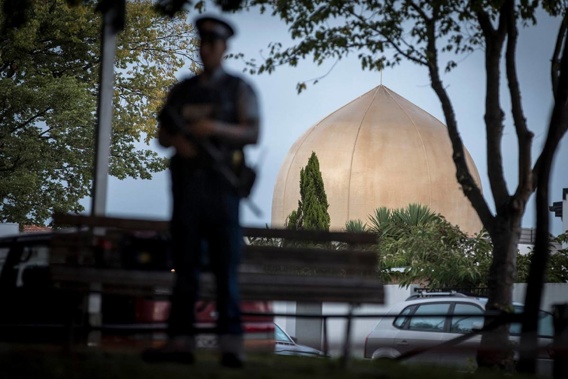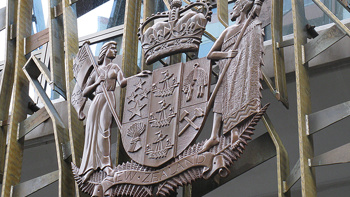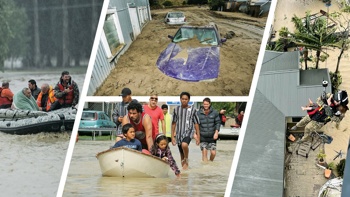
Mosque worshippers will be greeted by armed police officers, increased bag checks and ramped up security of "unprecedented" levels during Ramadan this year.
An imam said Islamic leaders had held multiple meetings with the police since the Christchurch mosque attacks and been told of heightened security levels during the holiest month in the Islamic calendar.
Baitul Muqeet Mosque imam Shafiq ur Rehman said police - who had been guarding the mosque every day since the March 15 Christchurch mosque attacks - left after the terror level was downgraded last week.
But armed officers will return to the mosque for Ramadan and be there for the whole month.
Depending on moon sighting, Ramadan is predicted to begin this year on the evening of May 6 and finish on June 4. Eid ul Fitr, an end of fasting celebration, will take place the day after.
New Zealand is a population destination for Muslim tourists who want shorter fasting days.
Ramadan, over the past few years, has taken place over the shortest winter days, meaning Muslims here fast for about 12 hours compared to more than 19 hours in Europe or about 15 hours in the Middle East.
/arc-anglerfish-syd-prod-nzme.s3.amazonaws.com/public/MWUFZN3BX5DPFCQCJUYU55OOIE.jpg)
Sultan Eusoff, chief executive of the Federation of Islamic Associations of NZ (Fianz), said the Kilbirnie Mosque in Wellington had a recent increase in the number of local and overseas visitors.
"This includes Muslims and non-Muslims," he said.
New Zealand's terror threat level was downgraded to "medium" on April 17, after being lifted to high for the first time in the country's history since the March 15 Christchurch attacks which left 50 dead and 50 others wounded.
Medium is defined as "a terrorist attack is assessed as feasible and could well occur", but it means police need not routinely carry firearms.
Shafiq said police had told him armed officers were returning to guard mosques for the duration of the Islamic holy month.
There are about 60 mosques in New Zealand.
A police spokeswoman said police were not able to comment on specific deployment or discuss security information for operational reasons.
However, she said the safety of the community remained a priority and the high visible presence of police staff was continuing.
"We continue to have staff at potential risk sites where appropriate, carrying out a range of security and visibility measures," she said.
"These sites may include churches, synagogues, mosques and major events."
The spokeswoman also urged people to report any suspicious or concerning behaviour to police by calling 111.
/arc-anglerfish-syd-prod-nzme.s3.amazonaws.com/public/AASEZOIEOVC57J4LB5HCGH3THU.jpg)
"While we have no information to suggest any specific risk to public safety at this time, our advice to the public continues to be that they should remain vigilant," she added.
Imam Shafiq said there was a spike in the number of people wishing to take part in the mosque's Ramadan rituals this year.
More people were curious about Islam after the attacks, others wanted to do it to show solidarity with Muslims.
The South Auckland-based Ahmadiyya Muslim mosque host an "Iftari" experience for non-Muslims at Ramadan, and is this year booked up for its session on May 18.
"Usually we get 100 to 150 people, but this year we've already got 200, and that's all the mosque hall can fit," Shafiq said.
He said police had requested Ramadan prayer schedules and had committed to having armed officers present at the mosque during every evening prayer over the holy month.
"Where there was a feeling of insecurity after the events of Christchurch, I hope the believers ... will feel more secure with the presence of the armed police at the mosque gates and they can be more focused in prayer," Shafiq said.
/arc-anglerfish-syd-prod-nzme.s3.amazonaws.com/public/MZLDGT3WV5BX5K65MRERKLRS3E.jpg)
"The security at mosques will be at unprecedented levels this year."
There are about 50,000 Muslims in New Zealand. Every Muslim is required to fast during Ramadan, except for pre-pubescent children, the elderly and sick.
Meanwhile, Fainz has cancelled a nationwide mosques open day which was initially schedule to take place today.
Spokesman Dr Anwar Ghani said the federation did not want to put extra pressure on police who were continuing to keep armed guards at mosques.
The open days, planned as a gesture of thanks for the support Muslims received from the wider community after the Christchurch attacks, will now take place at most mosques after Ramadan.
Ghani said "it wouldn't be right" to have the open days so close to Anzac Day.
"However, I do want to express our heartfelt gratitude to the entire nation for its empathy and support during this difficult period," he said.
"We look forward to welcoming [visitors] into our mosques as soon as it is appropriate to do so."
In an inspiring speech at Christchurch's Al Noor Mosque, where 42 Muslim worshippers were killed, Prince William called on all to unite to fight racism in all its forms.
"The global idealism of hate will fail to divide us," he said.
Speaking to about 100 members of the Muslim community and dignitaries including Prime Minister Jacinda Ardern, the Prince commended Christchurch and New Zealand for the way it had responded to the shootings.
Q&A
What is Ramadan?
Ramadan is considered to be the holiest month by Muslims, when the Koran, the Islamic holy book, was revealed to prophet Muhammad.
When is Ramadan?
Depending on moon sighting, or hilal, the month will start this year on Monday, May 6 and will continue for 30 days until June 4.
Why do Muslims fast?
Fasting is one of the five pillars of Islam, and fasting in Ramadan is obligatory for Muslims. No food or drink is consumed during daylight hours.
Where are the longest and shortest fasts in the world?
In Iceland, fasting averages more than 20 hours, whereas the shorter winter days means the fasting day in New Zealand and Australia is just about 12 hours.
Take your Radio, Podcasts and Music with you









